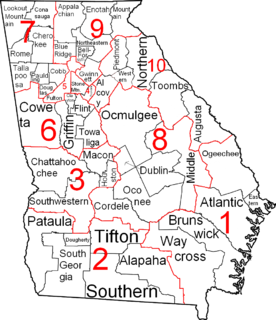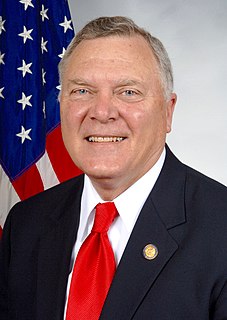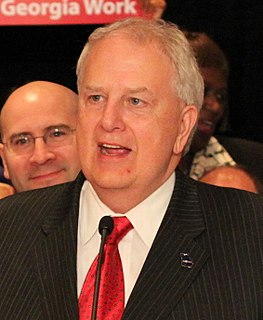This article's factual accuracy may be compromised due to out-of-date information.(November 2012) |
| Elections in Georgia | ||||||||||
|---|---|---|---|---|---|---|---|---|---|---|
 | ||||||||||
| ||||||||||
This article's factual accuracy may be compromised due to out-of-date information.(November 2012) |
| Elections in Georgia | ||||||||||
|---|---|---|---|---|---|---|---|---|---|---|
 | ||||||||||
| ||||||||||
| Party | Candidate | Votes | % | ± | |
|---|---|---|---|---|---|
| Republican | Johnny Isakson (Incumbent) | 1,489,904 | 58.31% | +0.43% | |
| Democratic | Michael Thurmond | 996,516 | 39.00% | -0.98% | |
| Libertarian | Chuck Donovan | 68,750 | 2.69% | +0.55% | |
| Independent | Steve Davis (write-in) | 52 | 0.00% | N/A | |
| Independent | Raymond Beckworth (write-in) | 24 | 0.00% | N/A | |
| Independent | Brian Russell Brown (write-in) | 12 | 0.00% | N/A | |
| Majority | 493,388 | 19.31% | |||
| Total votes | 2,555,258 | 100.00% | |||
| Republican hold | Swing | ||||
| United States House of Representatives elections in Georgia, 2010 | |||||
|---|---|---|---|---|---|
| Party | Votes | Percentage | Seats | +/– | |
| Republican | 1,528,142 | 61.90% | 8 | +1 | |
| Democratic | 940,347 | 38.09% | 5 | -1 | |
| Write-in | 191 | 0.01% | 0 | ||
Incumbent Governor Sonny Perdue (R) was ineligible to seek re-election due to term limits. The Republican primary featured four candidates who received over 15% of the vote in the first round: former Secretary of State Karen Handel, former U.S. Representative Nathan Deal, former Georgia State Senator Eric Johnson, and Insurance Commissioner John Oxendine. [2] Handel, Deal, and Johnson all resigned their offices during or shortly before the campaign. Because no candidate received a majority of the vote, the race went to a runoff between the top two candidates, Handel and Deal.

George Ervin "Sonny" Perdue III is an American veterinarian, businessman, and politician currently serving as the 31st United States Secretary of Agriculture since 2017. He previously served as the 81st Governor of Georgia from 2003 to 2011. He was the first Republican Governor of Georgia since Reconstruction.
The Secretary of State of the U.S. state of Georgia is an elected official with a wide variety of responsibilities, including supervising elections and maintaining public records.

Karen Christine Handel is an American businesswoman, politician, and former member of the United States House of Representatives. A Republican, Handel worked in business before entering politics. She first held elected office in 2003, chairing the Fulton County Board of Commissioners until 2006, and then was elected and served as Georgia's Secretary of State from 2007 to 2010.
| Party | Candidate | Votes | % | |
|---|---|---|---|---|
| Republican | Karen Handel | 231,990 | 34.1 | |
| Republican | Nathan Deal | 155,946 | 22.9 | |
| Republican | Eric Johnson | 136,792 | 20.1 | |
| Republican | John Oxendine | 115,421 | 17.0 | |
| Republican | Jeff Chapman | 20,636 | 3.0 | |
| Republican | Ray McBerry | 17,171 | 2.5 | |
| Republican | Otis Putnam | 2,543 | 0.4 | |
| Total votes | 680,499 | 100 | ||
Deal won the runoff narrowly, with a margin of about 0.4%, or 2,519 votes out of 579,551 cast. [3] The Democratic nomination was won easily by former Governor Roy Barnes without a runoff; his most prominent opponent was Attorney General Thurbert Baker. [4]

Roy Eugene Barnes is an American attorney and politician who served as the 80th Governor of the U.S. State of Georgia from 1999 to 2003. As of 2019, he is the last Democrat to serve as Governor of Georgia.
The Attorney General of Georgia is the chief law enforcement officer and lawyer for the U.S. state of Georgia. The officeholder is elected to a four-year term at the same time as elections are held for Governor of Georgia and other offices.
Thurbert E. Baker was the First African American Attorney General of the U.S. state of Georgia. He was appointed to that position in 1997 by Governor Zell Miller and served until January 10, 2011.
| Party | Candidate | Votes | % | |
|---|---|---|---|---|
| Republican | Nathan Deal | 291,035 | 50.2 | |
| Republican | Karen Handel | 288,516 | 49.8 | |
| Total votes | 579,551 | 100 | ||
| Party | Candidate | Votes | % | |
|---|---|---|---|---|
| Democratic | Roy Barnes | 259,482 | 65.6 | |
| Democratic | Thurbert Baker | 85,571 | 21.6 | |
| Democratic | David Poythress | 21,780 | 5.5 | |
| Democratic | DuBose Porter | 17,767 | 4.5 | |
| Democratic | Carl Camon | 4,170 | 1.1 | |
| Democratic | Bill Bolton | 3,573 | 0.9 | |
| Democratic | Randy Mangham | 3,124 | 0.8 | |
| Total votes | 395,497 | 100 | ||
In the general election, Deal defeated Barnes, becoming just the third Republican to be elected Governor of Georgia, after Perdue and Reconstruction-era governor Rufus Bullock.

Rufus Brown Bullock was a Republican Party politician and businessman in Georgia. During the Reconstruction Era he served as the state's governor and called for equal economic opportunity and political rights for blacks and whites in Georgia. He also promoted public education for both, and encouraged railroads, banks, and industrial development. During his governorship he requested federal military help to ensure the rights of freedmen; this made him "the most hated man in the state", and he had to flee the state without completing his term. After returning to Georgia and being found "not guilty" of corruption charges, for three decades afterwards he was an esteemed private citizen.
| Party | Candidate | Votes | % | ± | |
|---|---|---|---|---|---|
| Republican | Nathan Deal | 1,365,832 | 53.02% | -4.93% | |
| Democratic | Roy Barnes | 1,107,011 | 42.97% | +4.75% | |
| Libertarian | John Monds | 103,194 | 4.01% | +0.17% | |
| Write-ins | 124 | 0.00% | |||
| Majority | 258,821 | 10.05% | -9.68% | ||
| Turnout | 2,576,161 | ||||
| Republican hold | Swing | ||||
Other State Executive Officer positions that will be on the ballot include Lieutenant Governor, Secretary of State, Attorney General, State School Superintendent, Commissioner of Insurance, Commissioner of Agriculture, Commissioner of Labor, and a seat on the Georgia Public Service Commission.
The Georgia Public Service Commission (PSC) is a statutory organ of the state government of Georgia; elected among five commission districts, the board consists of a Chairman, a Vice-chairman, and three Commissioners. PSC regulates telecommunications, transportation, electric and natural gas services in the U.S. state of Georgia.
This section is empty.You can help by adding to it.(January 2011) |
This section is empty.You can help by adding to it.(January 2011) |
One seat on the Supreme Court of Georgia (contested), four on the Georgia Court of Appeals (one contested), and 58 on the Georgia Superior Courts (one contested) will be up for election. All judicial elections in Georgia are officially non-partisan.

The Supreme Court of Georgia is the highest judicial authority of the U.S. state of Georgia. The court was established in 1845 as a three-member panel. Since 1896, the justices have been elected by the people of the state. The justices are currently elected in statewide non-partisan elections for six-year terms, with any vacancies filled through an appointment by the Governor.
The Georgia Court of Appeals is the intermediate-level appellate court for the U.S. state of Georgia.

The Superior Court is Georgia's general jurisdiction trial court. It has exclusive, constitutional authority over felony cases, divorce, equity and cases regarding title to land. The exclusive jurisdiction of this court also covers such matters as declaratory judgments, habeas corpus, mandamus, quo warranto and prohibition. The Superior Court corrects errors made by lower courts by issuing writs of certiorari; for some lower courts, the right to direct review by the Superior Court applies.
Two measures, both legislatively referred constitutional amendments, will be on the ballot: the Trauma Care Funding Amendment (Impose $10 fee on car registration; funds directed to trauma care centers) and the Employment Contract Enforcement Amendment (Allow the enforcement of contracts that restrict competition during or after the term of employment).

John Nathan Deal is an American attorney and politician who served as the 82nd Governor of Georgia from 2011 to 2019. He was elected to the United States House of Representatives as a member of the Democratic Party in 1992 and switched to the Republican Party in 1995. On March 1, 2010, Deal announced his resignation from Congress to run for Governor of Georgia.
Elections in Georgia are held to fill various state and federal seats. Georgia regular elections are held every even year. The positions being decided each year varies, as the terms of office varies. Special elections are held to fill vacated offices. Georgia is one of seven states that require a run-off election if no candidate receives a majority of the vote in a primary election. Uniquely, Georgia requires a run-off election if no candidates wins a majority of the vote in a general election; only Louisiana has a similar requirement, but it operates under a different election system.

The 2006 Georgia gubernatorial election was held on November 7, 2006. Incumbent Republican Governor Sonny Perdue ran for re-election to a second and final term as governor. Governor Perdue was renominated by the Republican Party, defeating a minor opponent in the process, while Lieutenant Governor Mark Taylor narrowly emerged victorious from a competitive Democratic primary. In the general election, though Taylor ran a spirited campaign, Perdue was aided by the increasing tendency of the state to vote for Republicans and by his popularity with the public; polling showed his approval ratings above sixty percent. In the end, Perdue was overwhelmingly re-elected as governor, defeating Taylor in a landslide.
The Georgia statewide elections were held on November 7, 2006. The primary election was held on July 18. Contests in which no single candidate received a majority of the vote were decided in a runoff election on August 8.

United States gubernatorial elections were held on November 2, 2010 in 37 states and two territories. As in most midterm elections, the party controlling the White House lost ground. Democrats did take five governorships from the Republicans, and Republicans took 11 governorships from the Democrats. An independent won one governorship previously held by a Republican. A Republican won one governorship previously held by an independent. Republicans held a majority of governorships for the first time since before the 2006 elections. One state, Louisiana, had no election for governor, but did feature a special election for lieutenant governor.

The 2008 United States Senate election in Georgia took place on November 4, 2008. The run off election took place on December 2, 2008. Republican Senator Saxby Chambliss, first elected in 2002, sought re-election to his position as a United States Senator from Georgia. He was challenged by Democratic nominee Jim Martin and Libertarian nominee Allen Buckley. After a runoff election on December 2, Chambliss was elected.

The 2010 Georgia gubernatorial election was held on November 2, 2010. Incumbent Republican Governor Sonny Perdue was term-limited and unable to seek re-election. Primary elections for the Republican and Democratic parties took place on July 20, with a Republican runoff on August 10. The Libertarian Party also had ballot access and nominated John Monds. On November 2, 2010, Barnes conceded to Nathan Deal. He took office on January 10, 2011.
Georgia's state elections will be held on November 4, 2008. The primary elections were held on February 5, also known as Super Tuesday.
The 2010 Georgia statewide elections were held on November 2, 2010 in the U.S. state of Georgia. The primary elections were held on July 20. Primary contests in which no single candidate received a majority of the vote were decided in a runoff election on August 10.
Elections for state and federal offices for the 2010 election cycle in Connecticut were held on Tuesday, November 2, 2010. Any necessary primary elections for the Republican and Democratic parties were held on Tuesday, August 10, 2010.

Elections were held in Alabama on Tuesday, November 2, 2010. Primary elections were held on June 1, 2010 with the run-off on July 13.

The 2014 United States Senate election in Georgia was held on November 4, 2014, to elect a member of the United States Senate to represent the State of Georgia, concurrently with the election of the Governor of Georgia, as well as other elections to the United States Senate in other states and elections to the United States House of Representatives and various state and local elections.
The 2014 general election was held in the U.S. state of Texas on November 4, 2014. All of Texas' executive officers were up for election as well as a United States Senate seat, and all of Texas' thirty-six seats in the United States House of Representatives. Primary elections were held on March 4, 2014. Primary runoffs, required if no candidate wins a majority of the vote, were held on May 27, 2014. Elections were also held for the Texas legislature and proposition 1, seeking funds for Texas highways.

A general election was held in the U.S. state of Arkansas on November 4, 2014. All of Arkansas' executive officers were up for election as well as a United States Senate seat, and all of Arkansas' four seats in the United States House of Representatives. Primary elections were held on May 20, 2014 for offices that need to nominate candidates. Primary runoffs, necessary if no candidate wins a majority of the vote, were held on June 10, 2014.
A general election were held in the U.S. state of Georgia on November 4, 2014. All of Georgia's executive officers were up for election as well as a United States Senate seat, all of Georgia's fourteen seats in the United States House of Representatives and all seats in both houses of the Georgia General Assembly. Primary elections were held on May 20, 2014. Primary runoffs, necessary if no candidate wins a majority of the vote, were held on July 22, 2014.

The 2018 Georgia gubernatorial election took place on November 6, 2018, concurrently with other statewide and local elections to elect the next governor of the U.S. state of Georgia. Incumbent Republican Governor Nathan Deal was term-limited and thus could not seek re-election to a third consecutive term.
A general election was held in the U.S. state of Georgia on November 6, 2018. All of Georgia's executive officers were up for election as well as all of Georgia's fourteen seats in the United States House of Representatives. Neither U.S. Senate seat was up for election in 2018.

A special election to determine the member of the United States House of Representatives for Georgia's 6th congressional district was held on April 18, 2017, with a runoff held two months later on June 20. Republican Karen Handel defeated Democrat Jon Ossoff in the runoff vote, 51.8% to 48.2%. Handel succeeded Tom Price, who resigned from the seat following his confirmation as United States Secretary of Health and Human Services in the Trump Administration. The runoff election was necessary when no individual candidate earned the majority of votes in the election on April 18. Ossoff received 48.1% of the vote in the first round, followed by Handel with 19.8%.

North Dakota held two statewide elections in 2018: a primary election on Tuesday, June 12, and a general election on Tuesday, November 6. In addition, each township elected officers on Tuesday, March 20, and each school district held their elections on a date of their choosing between April 1 and June 30.

The Center for Responsive Politics (CRP) is a non-profit, nonpartisan research group based in Washington, D.C., that tracks the effects of money and lobbying on elections and public policy. It maintains a public online database of its information.

The Atlanta Journal-Constitution (AJC) is the only major daily newspaper in the metropolitan area of Atlanta, Georgia, United States. It is the flagship publication of Cox Enterprises. The Atlanta Journal-Constitution is the result of the merger between The Atlanta Journal and The Atlanta Constitution. The two staffs were combined in 1982. Separate publication of the morning Constitution and afternoon Journal ended in 2001 in favor of a single morning paper under the Journal-Constitution name.